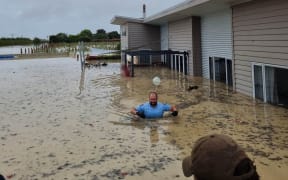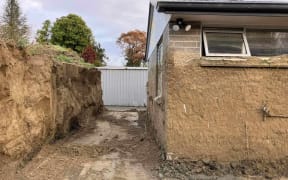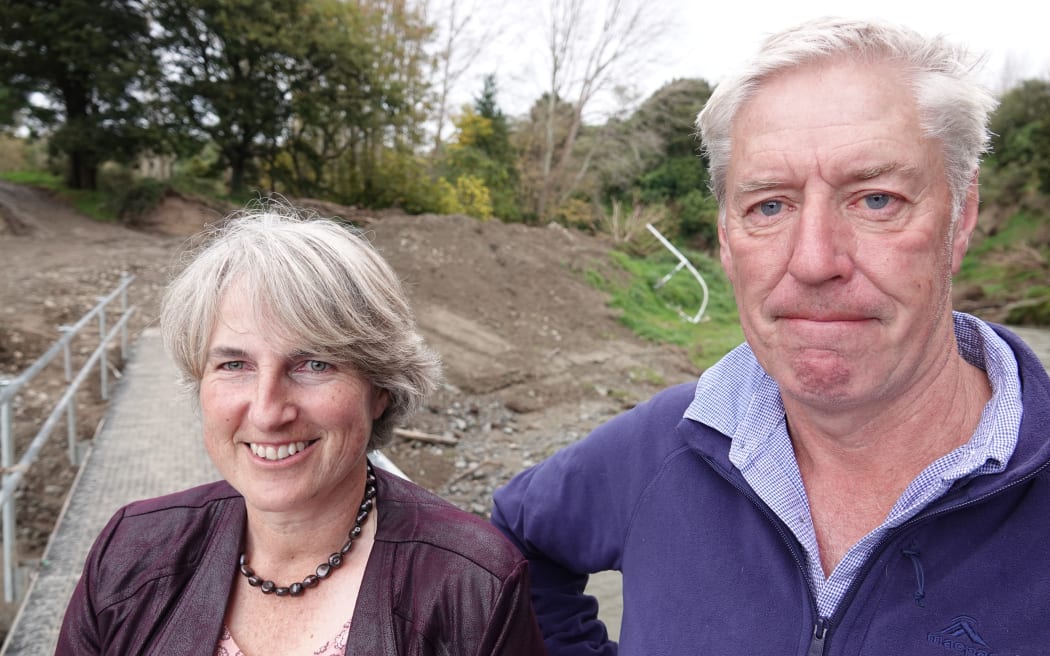
Charlie, left, and Hamish Menzies say farming in Tararua is full of challenges. Photo: RNZ / Jimmy Ellingham
The forecast hot, dry El Niño summer is placing extra stress on farmers battered by Cyclone Gabrielle.
In the lower North Island's Tararua District, a big dry could hit particularly hard after a boggy winter.
During Cyclone Gabrielle in February, sheep, beef and deer farmers Charlie and Hamish Menzies lost the access bridge over the northern reaches of the Manawatū River to their property, north of Dannevirke. The bridge was at the end of a council-maintained road.
A temporary ford allowed four-wheel-drive vehicles in and out, and there was also a footbridge.
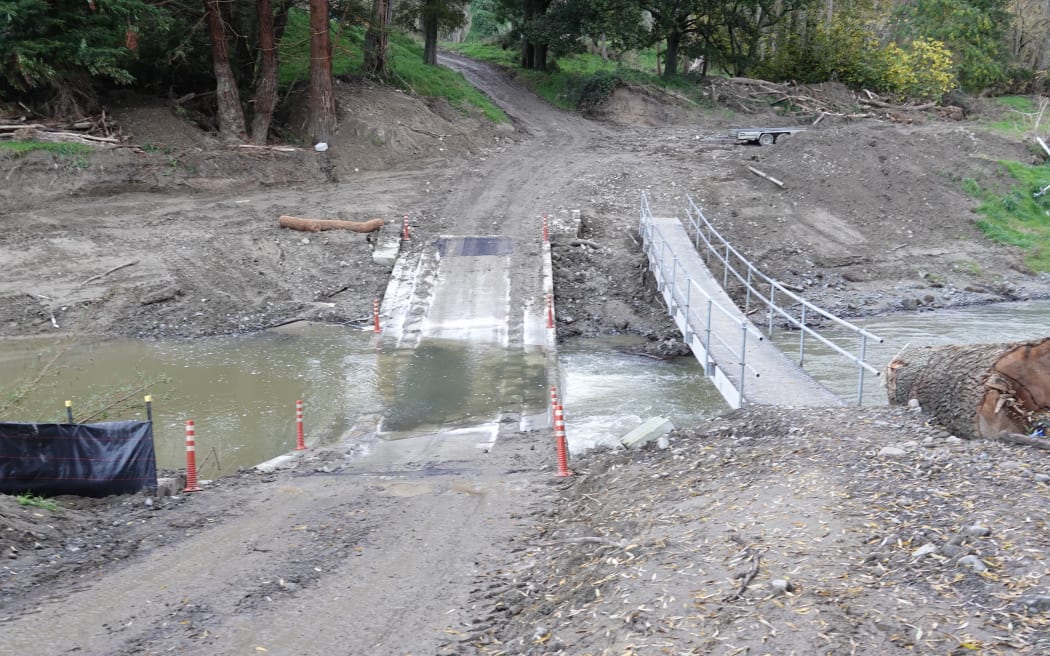
A photo of the ford and foot bridge, taken in May. Photo: RNZ / Jimmy Ellingham
However, that bridge washed out over winter, meaning Charlie Menzies had to take a boat to get to her teaching job in Dannevirke, as she did for months earlier this year before the temporary fixes.
"We're still at the mercy of the elements as far as getting in and out of the farm is concerned," she said.
"The big thing is getting stock in and out. My husband has an old stock crate which he has on a trailer, and we have been able to put a small amount of stock on that and use two tractors to pull it across the ford, and then trans-ship on to a stock truck that can come to the end of the road.
"It's a mission. The ford sank when water went underneath it, so it's quite steep and we worry about stock as they're transported across."
The Menzies had learned to live by the ebb and flow of the river, she said.
"It makes it quite stressful having to be so aware of the impact of the water on how we function.
"You think, 'Oh shoot, we'd better go into town to get something today because it's going to rain tomorrow and the river will come up'."
Menzies said she and her husband did not know when a permanent fix would happen, although it was unlikely the old bridge would be rebuilt because it carried insufficient traffic.
A new access road through farmland was not viable either, she said.
"It would cost millions to put a road through and, for me, I'm not going to go to work and open 15 gates.
"The bridge that they are thinking of replacing is at the footbridge level, which is a better bet, but it means, for me, there will be some days when I can't go to work if the river floods and goes over.
"It's probably what we're going to end up with, but it means that life for us is not going to be as uncomplicated as it was prior to Cyclone Gabrielle."
They bought the farm off Hamish Menzies' parents in 1998 - a year of serious El Niño drought.
Something similar could be on the horizon this summer.
"Farming in the Tararua District, I think, is going to be quite challenging. We're heading into El Niño, (which means) increased westerlies.
"There's a very good wet base underneath, but that wind dries the top out very quickly, and soil temperatures haven't lifted because the soil is so wet. So, the growth probably hasn't been as fast as we would have wanted."
These conditions come not only after a tough, wet winter - but a wet few years.
"The damage is not just from slips, but pugging from cattle is significant, and there are huge movements of land that have been stable for 50 or 60 years that have begun to move again with the incredible rainfall."
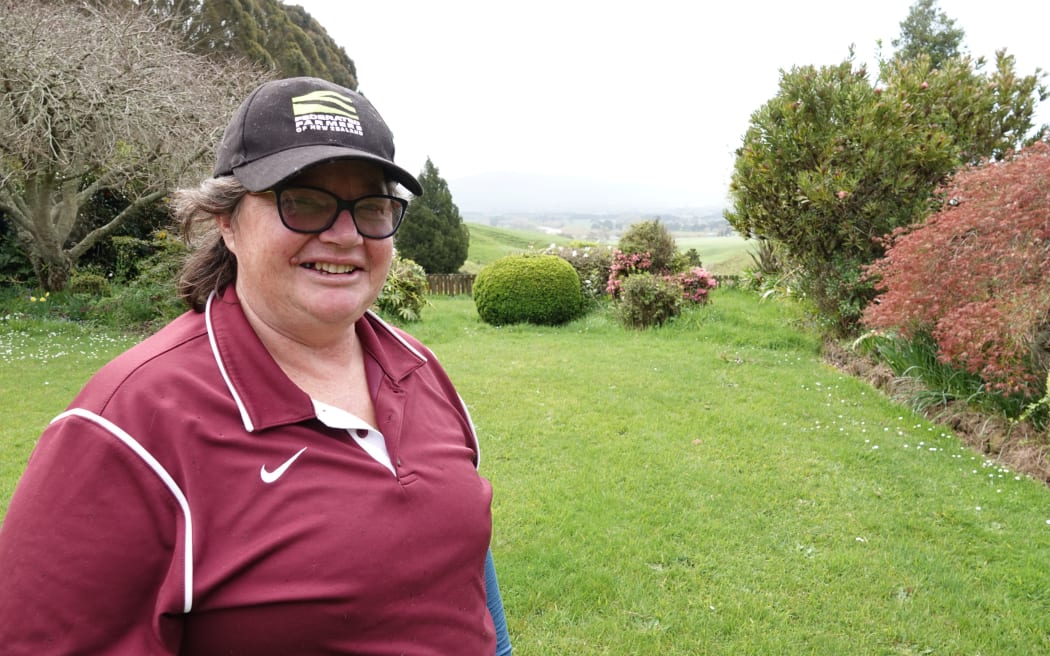
Sally Dryland. Photo: RNZ / Jimmy Ellingham
Federated Farmers Tararua co-president Sally Dryland said some members were feeling tired and nervous.
Many were facing increased costs - such as for fuel - because stock was trucked out using longer routes to avoid cyclone-damaged roads.
"The majority have had a very very wet winter. That's been hard, and then they still haven't had the fencing repairs or track repairs that they'd like done, but in September we got a bit of fine weather.
"We thought this is great, and then it rained again."
Farmers needed to make good, early decisions ahead of summer, such as getting rid of excess stock, and talk to older farmers who had survived droughts, she said.
Dryland's 240-hectare beef farm is near Mangatainoka and she said if it turned dry there the rest of the region would be in trouble.
"There's some very diverse areas within the Tararuas. The Eketāhuna dairy population got hit pretty hard last time.
"Anywhere that's got stones underneath for drainage is more likely to burn off."
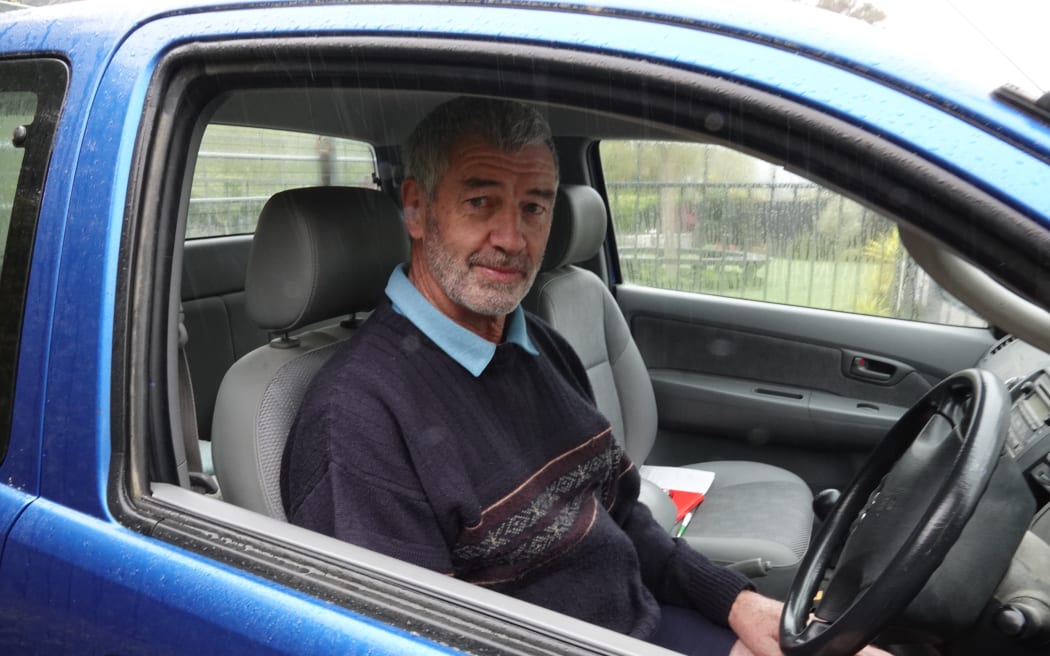
Murray Holdaway. Photo: RNZ / Jimmy Ellingham
Manawatū-Rangitīkei Rural Family Support Trust chairperson Murray Holdaway, who farmed at Ballance in the Tararua District, said farmers would get through a dry summer, although resilience should not be taken for granted.
"Drought's a particularly different adverse event to most other adverse events because it comes in slowly," he said.
"With a drought we can actually have some meetings to prepare ourselves for it because we can see it start to happen.
"What often happens with those sorts of situations is we get to a point where we think the community might need some help, so we organise events just to get farmers off farm and talking to other farmers.
"We also have it in the back of our mind that there's a pretty good chance that when we organise a drought event it will make it rain, so we're thinking about having those events fairly early in the piece, if possible, to make it rain."
Farmers could not be complacent, he said.
Grass would grow during wet periods, but often it could not be reached by stock.
"You can actually go from having plenty of grass and not being able to utilise it to having little grass, and often that can happen seriously quickly.
"Farmers will have it in their mind in planning for a dry period, but often when you're coming out of a period when it's very wet you're just relieved when soils are starting to dry.
"Within a couple of weeks you can miss the boat a little bit in terms of adjusting your management."
MetService meteorologist Lewis Ferris said the past two summers had been exceptionally wet, but this one would be different.
"That wind - especially a dry one in the Tararuas, having come over the hills and drying out as it descends - that's just going to keep the soil moisture quite low."
As tropical cyclone season approached, Tararua could still expect heavy rainfall sometimes, but a drier summer overall.
In contrast, for the past two years a weather station at Dannevirke had recorded rainfall in the 90th percentile of its century-long history.
"This summer, it does like like we're going to see almost the opposite of that. Instead of getting those big downpours it does look more likely to be longer periods of dry weather."
The Tararua District last had a dry period in early 2020.
At the Dannevirke weather station, Ferris said 95 millimetres of rain fell in the three months from December 2019, but 71mm of those were in that month, so it was parched after Christmas.
Ferris also urged people to be conscious of fire safety by keeping dry grass short and not stacking firewood against homes.
